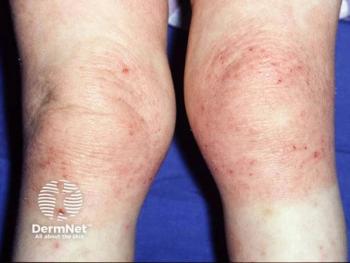
Breaking the AD Cycle
Experts offer their clinical experience on preventing patient withdrawal and breaking the atopic dermatitis (AD) disease cycle.
Episodes in this series

Transcript
Shawn Kwatra, MD: Tell me a little bit about the rapidity of response and your thoughts on it. My approach is, if I see someone with severe eczema, I want to go in powerfully. Sometimes, that means [prescribing] clobetasol, Lidex, topical ruxolitinib, and other [similar] compounds. [After that,] I think I’d feel comfortable pulling back a little bit. But...what [can you say] about efficacy, rapidity, and safety? To me, it’s such a short clinical visit and [I try] to explain to patients the benefits and the risks [of certain treatments]. Ultimately, a lot of it is also the doctor’s philosophy about treatment. Any thoughts on that?
Peter Lio, MD, FAAD: Absolutely. [The implication is that]...if what you do in this short visit [is not enough], or if they go home and it doesn’t seem to work after a few days, you’re going to lose the patient....They’re going to say, this guy gave me some[thing] and it didn’t work. [Then you say, “Wait, you need to use it a couple of days], can you give it a little more time?,” but they won’t. There are many reasons [for] treating [atopic dermatitis] aggressively at first and then easing up....For [other] diseases, it can be [a] different [strategy], but for atopic dermatitis, it is the best policy. Part of the reason is [that] it’s a disease of vicious cycles. If you can break that cycle, I truly believe that [many,] if not all,...patients can get to a point where they’re in a relative remission state.
[There are the] key pathogenic pillars, as we call them—we have the skin barrier and nerve endings, which are morphologically, structurally different. They’re electrophysiologically different. There’s a behavioral component, the itch-scratch cycle, and that includes some of the sleep issues that are going on [with the patients] as well. There’s inflammation, which is dysregulated, and there’s the microbiome. Of course, all of these are connected and they’re all playing off [one another]. When the microbiome falls apart, the barrier gets crazy. If the barrier gets wonky, the microbiome falls apart. If there’s inflammation, IL-4 and IL-13 screw up filaggrin production, so the barrier suffers immediately. They’re in a vicious cycle....Once you break that cycle, though, you’re much more likely to enter the virtuous cycle of healing. The microbiome is getting back to normal and the skin barrier is healed and holding on to water again properly. To me, it makes so much sense to [treat] more aggressively at first. You get buy-in [from your patient]; you get rapid results. Plus, you literally get the win of [shortening the patient’s] time being itchy and miserable if you can just [heal them] faster. [There are] some medicines, if you do methotrexate off-label, [for example, where] it could [take] months before they even notice anything, but that can be months of misery [for them]. I don’t think it’s very fair to say, “Just take this and be patient.” [If] we can give them some early relief with [a medication that] helps them, then we can ease up, but I do know other clinicians feel...like [they] want to use the absolute bare minimum to [help their patients and, of course, we do] want to be careful and we never want to overtreat. That is [a] reasonable [approach]. Of course, with the oral JAK inhibitors, upadacitinib and abrocitinib, both are approved to start at a lower dose and...to only go to [a] higher dose if needed. We see this this conflict and tension throughout medicine.
Shawn Kwatra, MD: Absolutely, those are great points. I’m totally with you that if you don’t give [your patients] something that you think is going to have a high degree of confidence and efficacy, then you might lose them. If you lose them, then good luck getting them back into the fold and they might suffer for a very long time.
Transcript edited for clarity.
Newsletter
Like what you’re reading? Subscribe to Dermatology Times for weekly updates on therapies, innovations, and real-world practice tips.




















